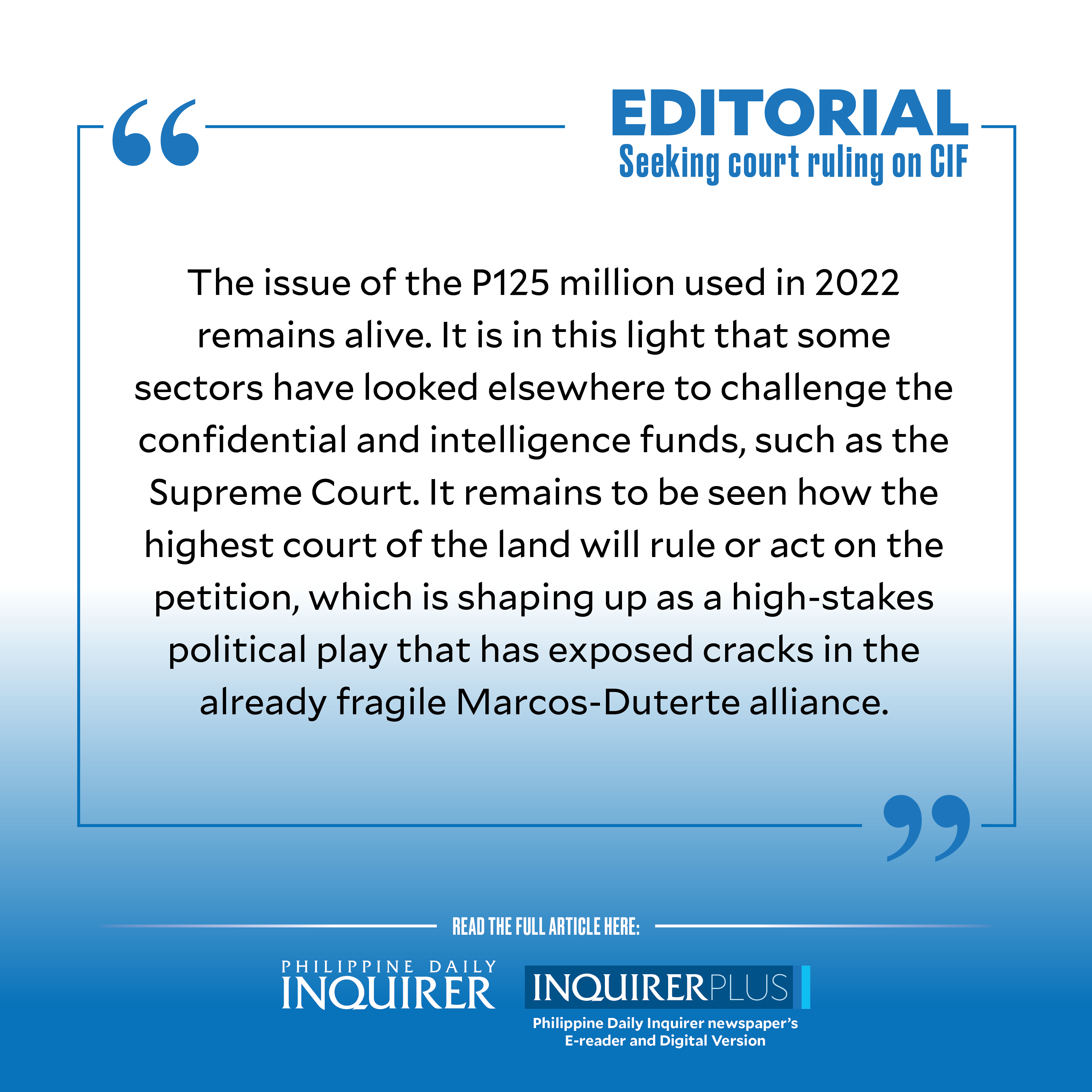Seeking court ruling on CIF
After generating much political noise, including rumors of a destabilization, the controversy over Malacañang’s transfer of millions in confidential funds to the Office of the Vice President (OVP) in 2022 is rightly lodged where it could be decided as a legal issue.
The Supreme Court has now been asked to determine whether the Executive branch committed abuse of discretion and usurped the powers of Congress when it transferred P125 million in confidential funds to Vice President Sara Duterte last year.
Article continues after this advertisementA petition for certiorari was filed on Tuesday by a group of constitutional and legal experts asking the high court to declare the transferred allocation as unconstitutional, and to order its return to the national treasury. Named respondents were the OVP, the Office of the Executive Secretary, and the Department of Budget and Management (DBM).It was only a matter of time before the P125-million question reached the high court following the revelation, during the House hearing on the OVP budget, that the OVP had used up that amount in just 11 days shortly before the end of last year. Moreover, it was disclosed that the amount was part of P221.4 million contingent funds that the Office of the President had transferred to the OVP in December 2022, a few months after the Marcos administration came to power. It was further revealed that Duterte, in a letter to Budget Secretary Amenah Pangandaman in August last year, asked for a total of P403.46 million, including P250 million for confidential expenses.
Early last September, veteran senator and former Senate president Franklin Drilon pointed out that the transfer “runs counter to the basic principles of budgeting and governance enshrined within Article VI, Section 25 (5) of the Constitution.” The provision states that “no law shall be passed authorizing any transfer of appropriations,’’ although the president, Senate president, speaker, chief justice, and heads of constitutional commissions “may, by law, be authorized to augment any item in the general appropriations law for their respective offices from savings in other items of their respective appropriations.’’Drilon said budget augmentation may only be allowed for existing but deficient items of appropriation. The OVP’s 2022 budget, a carryover from former vice president Leonor “Leni” Robredo’s, did not have any allocation for confidential and intelligence funds (CIF).
The reasons given for the request for CIF for the OVP—such as “safe implementation of various projects and activities under the Good Governance program,’’ travel, and the creation of regional satellite offices for Duterte—lead one to wonder why these all require confidential funds.The petitioners raised the same issue of constitutionality, arguing that “the appropriation done by the DBM is a clear usurpation of the legislative power of Congress to create and fund an item that has not been done so by Congress itself.” They said the confidential funds for the OVP did not fall under funding allowed by the contingent fund, and neither did the money come from savings.
Article continues after this advertisementEarlier, and in a rare move, the House found the will to exercise the “power of the purse” by realigning the controversial confidential funds in the 2024 budget, including the total of P650 million for the OVP and the Department of Education, both headed by Duterte. On Thursday, Duterte made the surprise announcement at the Senate that she is dropping her request for P650 million confidential funds for 2024. Will Malacañang similarly show newfound courage to let go of its confidential funds?
Still, the issue of the P125 million used in 2022 remains alive. It is in this light that some sectors have looked elsewhere to challenge the CIF, such as the Supreme Court. It remains to be seen how the highest court of the land will rule or act on the petition, which is shaping up as a high-stakes political play that has exposed cracks in the already fragile Marcos-Duterte alliance.
The petition against the transfer and allocation of confidential funds should however be decided away from the competing noise of politics, as this case seeks to illustrate how the principle of checks and balances among the three branches of government can work to safeguard public interest. At the heart of this issue is the judicious, responsible, and transparent use of taxpayer money which cannot otherwise be achieved when billions are allocated to CIF that are not subject to rigid auditing.
The floodgates of assigning CIF even to agencies that have no national security mandate or intelligence functions seem to have been opened under the Marcos administration. The need for jurisprudence is thus necessary to counter this alarming trend. The high court’s intervention is as crucial as its landmark decision in 2013, declaring as unconstitutional all forms of congressional pork barrel funds. More than a career-making move, as perceived by some politicians, the court petition merely seeks to ensure full accountability for public funds.

















